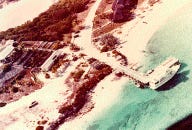The Logistical Mastermind Behind the Cocaine Empire
Carlos Lehder’s Story of Talent Without Morality
We know the names of Pablo Escobar and Griselda Blanco and their role in the rapid growth of the drug trade in the 1980s. Netflix made sure of that. But few realize that one man, Carlos Lehder, was instrumental in enabling their rise.
Lehder wasn’t just another cartel player—he revolutionized the cocaine trade, turning it from a niche market into a global empire. He was the logistical genius behind the multi-billion-dollar enterprise and his story shows that talent, devoid of morality, can wreak havoc.
After moving to the U.S. from Colombia as a teenager, Lehder started as a small-time car thief and marijuana dealer. His time in federal prison became a “finishing school” for his criminal career, where he learned money laundering from bankers, aviation from pilots, and drug smuggling routes from fishermen.
Lehder’s genius was in building a massive supply chain. He set up a logistics hub on the small Bahamian island of Norman’s Cay, which at its peak moved $60 million worth of cocaine daily. His connections, including Panama’s President Manuel Noriega, helped him launder money and establish trafficking routes through Central America. These routes laid the foundation for today’s cocaine trade, with Lehder’s personal wealth reaching an estimated $3 billion at its peak.
Federal prosecutor Robert Merkle, who helped convict Lehder in 1988, said he was to cocaine transportation what Henry Ford was to automobiles. As reported in the New York Times at the close of the case, Merke said,
''Henry Ford pioneered the mass manufacture of automobiles,'' Mr. Merkle said. ''Carlos Lehder pioneered the mass transportation of cocaine. Mr. Ford sought to help the American consumer. Mr. Lehder sought to destroy the American consumer.''
Lehder didn’t just run drug operations—he built an entirely new system for large-scale drug logistics.
Once Lehder Had Wealth, He Wanted Power
However, Lehder’s ambitions went beyond trafficking. Influenced by fascist and revolutionary ideologies, he harbored deep resentment toward the U.S. and sought to destroy it through the drug trade. He even helped Escobar enter Colombian politics to create a plutocracy where wealth dictated power.
To U.S. and Colombian authorities, Lehder was a dangerous adversary. But to the cartels, he was indispensable—a visionary who knew how to overcome obstacles and execute bold strategies. Seth Godin might call him a “linchpin,” someone who invents the future and doesn’t wait for instructions. Lehder constantly adapted to stay ahead of law enforcement.
This raises the question: What if Lehder had used his talents for good? What if his logistical genius had been applied to building a global business instead of fueling a drug war?
Lehder rose to power during the 1980s, a time of growing demand in the drug trade, much like the tech booms of recent years. In another context, he might have been a Silicon Valley entrepreneur, celebrated as a visionary rather than condemned as a criminal.
Like Jonadab, Lehder was Streetwise and Destructive
Like Jonadab, a biblical figure we discussed in a previous article, Lehder was streetwise and skilled at navigating challenges. But also like Jonadab, he lacked a moral compass. Instead of using his talents to improve society, he fueled the destruction of communities.
Jonadab was key to hatching the scheme to entrap Tamar when the king’s son Amnon lusted after her. That plot got Amnon what he wanted quickly, but devastated Tamar and led to escalating violence in the kingdom that culminated in an insurrection.
Lehder’s story, like Jonadab’s, reminds us that talent and ingenuity are morally neutral. The same skills that allow someone to disrupt the status quo and build something new can be used for good or evil, depending on their values and choices. Lehder’s story is a warning that great ability without a strong moral foundation can lead to harm rather than benefit.
What if we saw business acumen as morally neutral—capable of being used for either good or evil?
Mentors Have a Role in Shaping Potential for Good
Years ago, as a Girl Scout volunteer for an inner-city troop, I told a struggling camper she had leadership potential. I urged her to use her gifts for good, rather than bossing around her peers. My role as a mentor was to help shape her abilities for future success. Given her environment, she faced significant challenges, but with the right guidance, her leadership could be directed positively.
On the other hand, many of today’s business leaders had ideal environments to nurture their talents, but that doesn’t necessarily make them morally good. Some, like Lehder, show a desire to shape government to increase their own power and wealth, often at the expense of society’s well-being.
In Determining the Trajectory of Talent, Context Matters. So Does Morality.
Lehder’s ability to disrupt and build mirrors qualities we admire in entrepreneurs. Under different circumstances, he might have been one of them—an innovator in Silicon Valley rather than a notorious drug lord. His context shaped how he applied his skills.
When we admire business leaders for their innovation, we should remember that their talents could just as easily be used for harm. Reaching the top of an industry doesn’t ensure that the drive to break barriers will always lead to good. It’s the context, values, and choices behind the talent that truly matter.
Note: If you’re interested in watching a novella based on Lehder’s life, you can check out Paraíso Blanco on the Vix network. It’s based on the book Crazy Charlie. Lehder was also the subject of Episode Two of The Luthor Scale podcast, a show that dives into the world of real-life supervillains.



